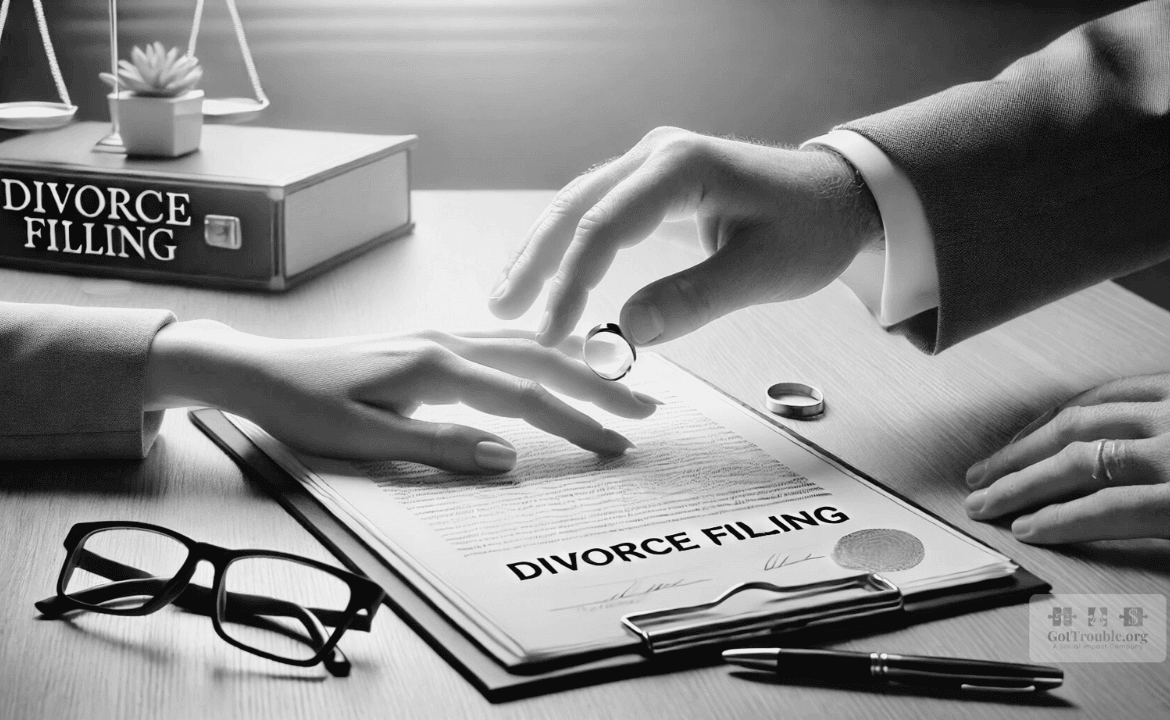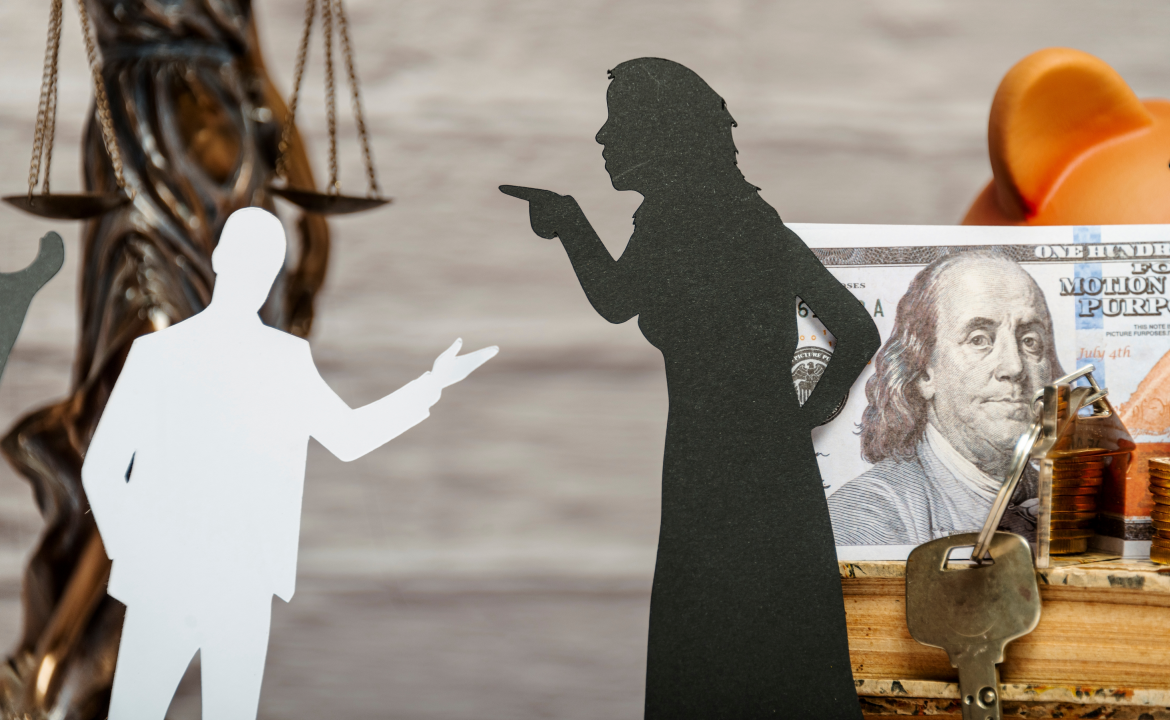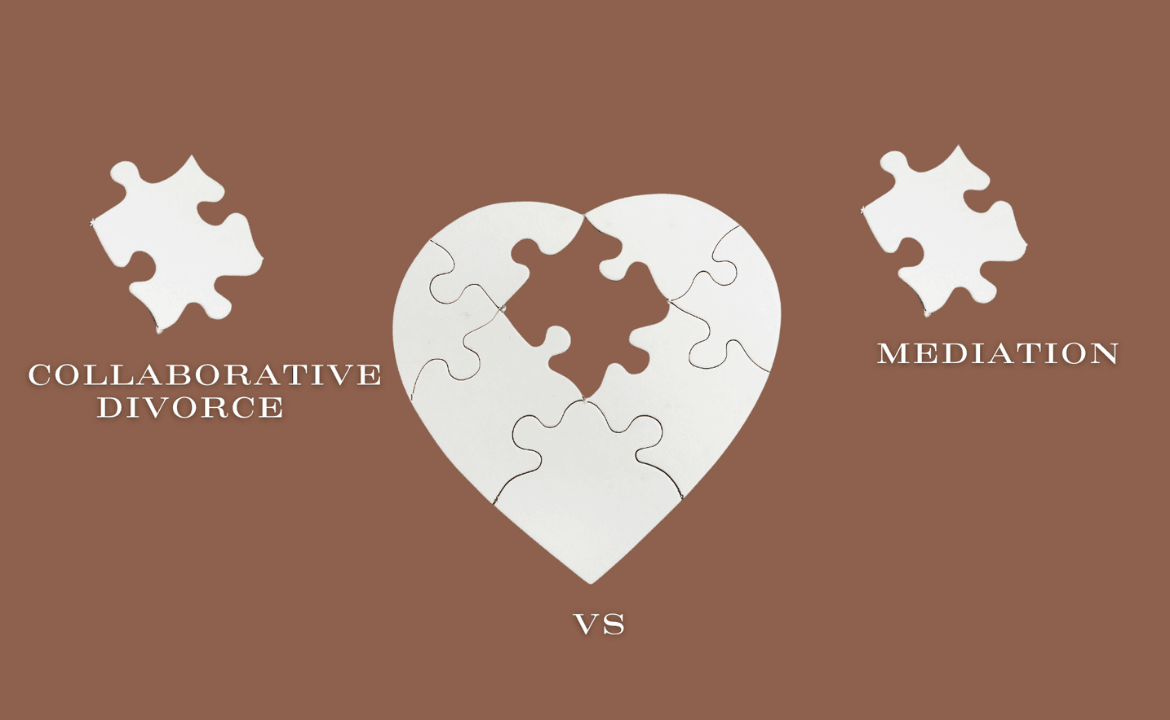Many people think that being the one to file for divorce first is a smart move. However, this choice can come with unexpected consequences that could complicate the divorce process and adversely impact the spouse who files for divorce first.
You will learn that filing first can affect not only the legal side of your case but also the financial and emotional sides of your life in unexpected ways.
About This Article
This article looks at the potential downsides of being the one to file for divorce first, including its unintended consequences such as it’s:
- Strategic disadvantages
- Adverse legal complications
- Financial implications
- Emotional impact
- Social consequences
This article also covers the common misconceptions and fears about filing for divorce first.
Let’s first examine some of the potential strategic disadvantages of being the first to file divorce papers.
Strategic Disadvantages of Filing for Divorce First
Revealing Your Legal Strategy
If you are the first to file, you are also the first to lay out your grievances and the specific alleged grounds for your divorce. However, you might not have considered that your divorce papers, once filed with the court, become a public record.
This gives the opposing side, the responding party, immediate and easy access to your divorce filing documents. This will afford them more time to prepare and develop important defensive and offensive strategies that could undermine and weaken the first filer’s case.
More Preparation Time
The first filer has unwittingly given the opposing side more time to prepare and investigate the alleged factual basis behind the first filer’s allegations, thereby building a more robust defense and counter-strategy for the responding party.
Such preparedness can lead to more calculated and effective responses, possibly disadvantaging the spouse who filed first by confronting them with well-prepared legal arguments and counter-claims.
Also, the first filer has unwittingly given the other spouse more time to retain and assemble a more effective legal team.
The first filer’s surprise attack can trigger an aggressive legal response, complicating the divorce and prolonging what might have been an early resolution through the mediation or collaborative divorce process.
Loss of Control Over Timeline After Filing First
One major drawback of being the first to file for divorce is the potential loss of control over how the situation unfolds.
Once the first filer submits the initial petition, the clock starts ticking, and your spouse will respond according to their timeline, which may or may not align with yours.
Sometimes, this can lead to frustrating delays in scheduling hearings or negotiations, stretching the entire process out longer than you anticipated.
The Workload of Preparing the Case
The petitioner has the burden of setting the tone for the case, which involves gathering evidence and all necessary documents and drafting their legal arguments.
Getting ready for this takes a lot of time and energy. You are under pressure, which can result in escalating levels of stress and anxiety, especially if you’re juggling your own work at the same time.
Outlining your case will require a lot of time and can feel like a marathon. It can be an exhausting process. If you’re not careful, you might miss something important or end up feeling too worn out, which can hurt your case.
Impact on Child Custody Arrangements and Asset Division
Early filing can significantly affect decisions related to child custody and asset division. The court may view the first filing as an indicator of commitment to certain positions, which could influence the court’s custody determinations.
Moreover, if the filing spouse makes specific claims about assets or property division in their initial petition, they may inadvertently limit their negotiating power to modify those claims later.
Legal Tip
Accelerating Conflict
Initiating a divorce can ignite existing conflicts and even spark new ones. What could have been a smooth negotiation can quickly spiral into a chaotic battle, with both sides stubbornly standing their ground.
As emotions intensify and legal expenses accumulate, the divorce process can transform into a prolonged, expensive, and bitter ordeal, far removed from the spouse’s original intentions.
Loss of Leverage in Negotiations
Filing for divorce first may lead to a perceived loss of leverage during negotiations.
When a spouse gets those divorce papers, they commonly feel defensive or backed into a corner, which can ramp up the tension instead of encouraging a more settlement-driven posture.
In some people, feelings of guilt and the emotional upheaval associated with filing first might lead the person who filed for divorce to make unnecessary concessions to keep things somewhat civil.
Financial Implications of Filing for Divorce First
The person who starts the process usually must cover the initial filing fees, which can add up to a hefty sum, depending on your jurisdiction and the aggressiveness of your lawyers.
In addition, the petitioner often faces higher legal costs early on, such as hiring a divorce lawyer to do extensive preparation work, advancing investigative fees, and expenses for gathering all the necessary documents and evidence.
Breakdown of Legal Fees and Upfront Costs
Divorce legal fees can add up quickly, and they often depend on how complicated your case is, the hourly rate of your divorce attorneys, and the degree to which the divorce lawyers will aggressively prepare your case for trial.
Financial Tips
Impact on Mutual Assets
Filing for divorce first almost always kickstarts a whole chain of events. It may push your spouse to make defensive but unwise financial moves, such as hiding or relocating assets.
Long-term Financial Consequences
Going through a divorce can have some serious long-term financial effects, like alimony and dividing up property.
It really depends on factors such as the length of the marriage, the couple’s lifestyle during that time, and each person’s financial situation after the divorce.
Early filing can trigger rushed decisions about significant financial matters, such as the sale of shared property or the division of retirement accounts. Depending on your situation, these decisions might not yield the most beneficial long-term outcomes.
These decisions, made under the stress and urgency of the initial filing, can lead to financial agreements that are hard to reverse and may not adequately reflect your long-term economic and estate planning interests.
Consequently, it’s crucial to consider the immediate implications of filing first and how these decisions could impact your financial health in the future.
Tips for Mitigating Financial Stress and Strain
To manage these potential costs, spouses should consider alternative dispute resolutions like mediation or collaborative divorce, which avoids bitter and prolonged court battles and associated fees.

Emotional Toll of Filing for Divorce First
Filing for divorce first can weigh heavily on the person taking that step. Usually, it’s a decision that comes from some deeply felt emotional issues, and it can bring up a lot of remorse, anxiety, and depression about what will happen next.
If you file first, you might feel a sense of sudden isolation from your partner, making the breakup feel real and permanent.
Plus, major worries can add to the stress, like how the children will be affected, financial concerns, and the potential for escalating conflict during negotiations.
The combined impact of all these concerns and worries can make you feel like you are on an emotional roller coaster.
Effects on Children and Family Stability
Divorce is incredibly disruptive to a family. Not just for the couple but also their children. Children are confused, fearful, and sad as family dynamics change.
How the person who files first handles the separation from the children will impact how the children will view that parent. Unless the parent who filed first makes an authentic effort to maintain strong emotional ties with the children, the other spouse can blame the divorce on the parent who filed first.
This can lead to parental alienation, which has been shown to damage both the children and the parent blamed for the family’s breakup.
A hostile and chaotic divorce will emotionally impact the whole family and take an extraordinary toll on the children’s emotional health.
Potential for Reconciliation Weakened
By filing for divorce, you risk shutting down any remaining possibilities for reconciliation.
A change of heart can present its own risks, as it might require withdrawing the petition, which could cause more confusion and animosity between the parties.
This is why, before you decide to file, you should take a step back and consider the potential legal, financial, and emotional implications you might be setting into motion.
Before rushing to file a divorce, consider all your options, including whether there’s a chance to repair the relationship through marriage counseling.
Seeking Out Support and Advice Before Filing
If you’re considering filing for divorce, several support and advice options exist.
Wellness Tips
Post-Filing Social Consequences
After filing for divorce, things can get awkward and more complicated socially.
Mutual friends can feel stuck during your breakup, leading to uncomfortable situations for both parties
Even without picking sides, family and close friends can shape how we feel about having filed for divorce.
Some might side with the spouse who filed for divorce, while others favor the spouse served with the divorce papers.
These different opinions can create awkward social divides, making everything less stable and emotionally challenging.
It would help if you also considered that friends and family have a way of sharing their unsolicited advice, which can lead to offensive comments and confusing misunderstandings.
Plus, how the community views you might change, making social interactions feel different and possibly leaving you feeling more isolated and alone.
You might also start re-evaluating your social circle, figuring out who is genuinely supportive and who is just adding their two cents because they can.
Strategies to Navigate Social Challenges
Navigating the social challenges of divorce can be tricky. Still, there are some constructive strategies you might consider before you enter the fray of social interactions.
First, it is essential to set clear boundaries with friends and family about the support you need. This can help avoid misunderstandings.
Finding supportive communities or groups, whether online or in-person, can offer a safe space to share your experiences and gain fresh perspectives.
Individual or group therapy can also be a great way to process feelings.
Lastly, remember the importance of having self-compassion for what you are going through. Mindful self-care is critical to your emotional stability, can keep you centered, and boost your resilience during this transitional time.
Consider joining a meditation or yoga group. Both have been shown to cultivate inner peace and resilience in times of change and challenge.
More Legal Implications of Filing for Divorce First
The Filer’s Character and Intentions – Possible Court Bias
The order in which the parties file for divorce can be more important than you first think.
Courts will look at who filed to gauge each party’s true intentions. For example, a judge might see the first filer as more committed to ending the marriage, which could sway decisions about custody and alimony.
On the other hand, if the responding spouse appears more stable or ready to move on, the court might rule in their favor.
Some judges might view the first filer as a vindictive or strategic move to game the system.
Division of Property – Potential Bias Against the Filing Party
For example, some state jurisdictions follow the law of equitable distribution laws, which allow courts to rule on what they determine to be a fair and equitable division of marital property.
The court’s determination of what’s fair and equitable in dividing marital property is said to be within the court’s sound discretion. Sometimes, this will include the judge’s own subjective biases against one party or the other, such as the party who filed first, along with other factors the court might consider.
Other state jurisdictions follow community property laws, where marital property is split 50/50.
Spousal Support Laws
Some states emphasize factors such as the length of the marriage, income differences, financial needs of each party, and the requirements and legal impact surrounding prenuptial agreements when determining spousal support laws.
Again, most courts can exercise discretion in considering a host of factors in reaching a fair and just decision concerning spousal support. Again, the potential exists for the court’s decision to be based on their own subjective bias, such as which spouse was overly aggressive in trying to game the system, which might include being the first to file for divorce.
Child Custody Laws
Most, if not all, state divorce courts base their child custody decisions on which parent will serve the children’s best interests. One important factor is the parent’s character and moral fitness.
Again, the way the court subjectively views the first filer, such as being more aggressive and or more willing to game the system, can influence the court’s assessment of the parent’s character and whether this parent will ensure the best interests and welfare of the children.
This determination can profoundly affect custody arrangements and child support payments.
Common Misconceptions about Filing for Divorce First
Misconception #1: Filing first means you control the timeline
Reality: While filing first starts the process, the other spouse’s actions and the court’s schedule can still derail the timeline and cause delays.
Misconception #2: Filing first means you win
Reality: The outcome of a divorce depends on many factors, not just who files first. Courts tend to focus on fair division and the best interests of any children involved rather than who initiated the process.
Misconception #3: Filing first means you’ll get better custody terms
Reality: Custody is based on the child’s best interests – not who filed for divorce first. Filing first doesn’t give you any custody advantage.
Misconception #4: Filing first will prevent financial losses
Reality: Filing first doesn’t prevent financial losses. Asset division and financial outcomes are based on legal arguments and court decisions – not the order of filing.
Four Common Fears about Filing for Divorce First
Fear #1: Filing first will be too emotional
Reality: Divorce is emotional regardless of who files first. Get support from friends, family, or a therapist to manage the emotional fallout.
Fear #2: Filing first will make things worse
Reality: Communication and mediation can create tension initially but also help manage conflicts. Long-term impact depends on how both parties handle the process.
Fear #3: Filing first will hurt my kids
Reality: The Impact on kids depends on how parents handle the divorce. Prioritizing their well-being and being cooperative can and often does mitigate the damage.
Fear #4: Fear of Retaliation from the Other Spouse
Reality: Filing first will provoke a reaction, but a good legal plan can minimize those risks and keep things fair.
Bottom Line
At first glance, filing your divorce papers might seem smart, but it can have unintended risks and consequences.
Filing first can seem overly aggressive, which might ramp up tensions and lead to retaliation by the other side—especially if the spouse feels surprised and broadsided by the move.
Also, while never admitting it, some courts might consider who filed first important when deciding custody and marital support issues.
You and your lawyer should carefully consider all potential drawbacks to ensure that your early decision aligns with your long-term goals.
Reaching out for legal help from a local divorce lawyer as early as possible can help you establish a viable strategy and help you avoid problems later.





























